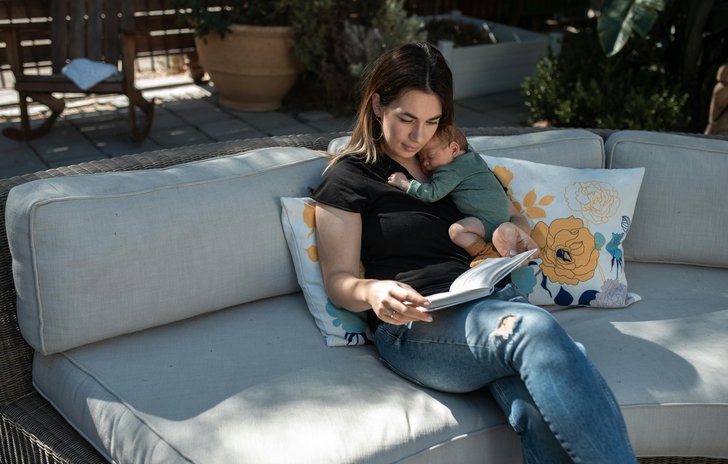This year ahead of our Take 10 to Read campaign, we spoke with Specialist Health Visitor for 1001 Critical Days, Sarah Cartner and Early Years Library Services Co-Ordinator, Amy Rose about why reading to your baby, and your bump, is so important.
Sarah, based in Newcastle upon Tyne, and Amy in Rochdale, work in partnership with our Early Years team to support families in their communities. Like us, they know that talking and listening to your baby helps to build their communication skills from the very start.
And the early introduction to books and sharing stories helps to ensure that every child is able to develop the literacy skills they need to succeed.
Hi Amy and Sarah, why is reading to your baby so important for expectant and new families?
Amy: We always stress to parents the importance of reading to their children, and we share the message – “it’s never too soon to start reading to your baby!” We have met many mums at our sessions who say that they waited before coming along to our parent and baby groups organised by the library service, as they worried the baby was too young. However, we always say it is never too soon to start reading to baby, and this includes sharing a story to your bump!
Sarah: Reading to your bump is important because language connections in the brain are already developing before the baby is born. These connections continue to develop rapidly during a child’s first few years and so the act of reading, sharing stories and talking to your little one is incredibly beneficial. It helps ensure that babies hear many different words which prepares them to learn and understand them as they grow.
Amy: Reading together has other brilliant benefits as it can be a time to snuggle up close, switch off any distractions and share special time together. Babies might not recognise words, or even understand what you’re reading, but they will enjoy looking at the pictures. Most importantly, they will enjoy the time together and listening to your voice.
Sarah: That time reading together can also help to develop the bond between siblings. Babies love to hear both their parents’ and siblings’ voices.
We know parents can face a lot of challenges when starting to read with their babies. Can you share how you have supported parents through some of these difficulties?
Amy: One of the main challenges we hear from parents is that they feel less confident reading themselves and can therefore feel self-conscious when reading with their child. At our sessions we always stress that it doesn’t matter if you’re not the most confident reader, or best singer of nursery rhymes; your baby just loves hearing your voice. We lead the storytelling ourselves and find that parents gain tips and confidence from having watched someone else read first.
Sarah: When I suggest that parents talk to their bump, I often hear that they don’t know what to say because they aren’t able to see the baby or get a verbal response back. One way for parents to overcome this challenge is to read to the bump, and we find that families often find it easier to read out loud. I encourage them to read baby books, maybe their favourite story as a child, or even a magazine or book they’re interested in themselves. If you’re not a confident reader, just talking about the pictures in baby books is great.
Life can get really busy for parents. Do you have any recommendations for helping find time for story sharing?
Amy: Bedtime is the perfect time to have a go at reading with your baby as reading can be a great way to wind down together. Sit somewhere cosy, comfortable, and quiet to snuggle up together. Find books you both enjoy - board books with flaps and touchy-feely parts are always popular with young babies- and most importantly, make it fun!
Sarah: I agree, incorporating story time into your bedtime and family routine is a great way to start building a habit of reading with your baby. Creating a flexible but consistent bedtime routine can also help babies to sleep better. Sharing a cuddle and a story to prepare for bed after a busy day helps babies, and busy parents, wind down. It's important to read the baby’s cues, such as when the baby may be ready for the story to pause or stop even if it’s not the end of the book. So, don’t worry if the story is cut short, this can be beneficial.
Can you recommend any other resources that parents can use to find out more, aside from our Words for Life website?
Amy: Another website for parents is the BookTrust website where you can find book recommendations by age, stories being read aloud that children can watch and listen to, and lots of tips and advice. The Tiny Happy People website is also great.
Sarah: NSPCC Look, say, sing, play is a great resource to learn about your baby’s development and ways to play and interact to help with brain development.
Thank you to Sarah and Amy for your time and great advice.
There are lots of practical ways you can get support from the National Literacy Trust both online and in your area. Our teams in towns and cities across the country run events all year round and are available with advice and resources to support you and your family. Find out what is happening in your area.
Our Words for Life website is filled with activities and tips to help your child develop a lifelong love of books and reading, which can help them to develop the vital literacy skills they need to succeed in life.
